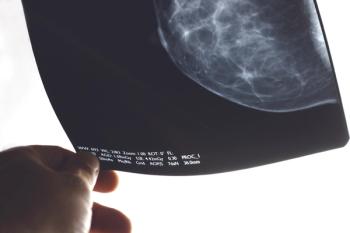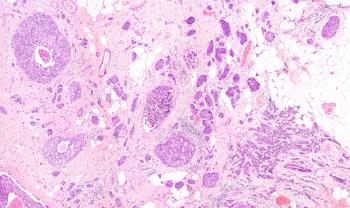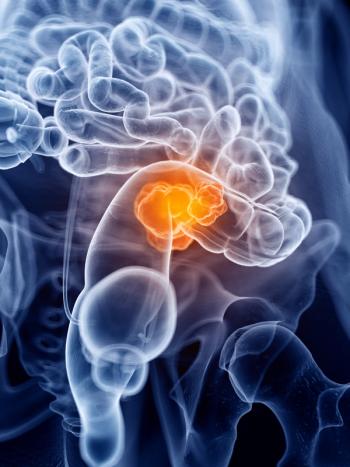
Oncology NEWS International
- Oncology NEWS International Vol 16 No 6
- Volume 16
- Issue 6
Nuclear Export Inhibitors Testing Moving Forward
Add to the growing list of novel anticancer agents the nuclear export inhibitors (NEIs), which are showing robust efficacy in vivo and are soon to be entering late-stage preclinical testing.
LOS ANGELESAdd to the growing list of novel anticancer agents the nuclear export inhibitors (NEIs), which are showing robust efficacy in vivo and are soon to be entering late-stage preclinical testing. Investigators from Kosan Biosciences, Inc., Hayward, California, described their candidate NEIs at the 2007 American Association for Cancer Research annual meeting (abstracts 5597 and 5609).
NEIs are direct and specific inhibitors of the nuclear export protein CRM1, which shuttles "cargo" proteins in and out of the nucleus, including proteins that contribute to carcinogenesis. Simply put, NEIs trap tumor suppressors and transcription factors in the nucleus, where they induce cell death (see science box). Tumor cell growth inhibition has been observed in multiple mouse models, said Sarah Mutka, PhD, senior scientist in biology at Kosan Biosciences.
NEIs are potent growth inhibitors, rapidly block nuclear export (Figure), have long-lasting inhibitory effects, rapidly induce apoptosis in tumor cells but not normal cells, are synergistic with many chemotherapeutic agents in vitro, and inhibit CRM1 in vivo in mouse experiments. The first compound to work through the mechanism of action of nuclear export inhibition was leptomycin, a polyketide natural product that was developed nearly 20 years ago but proved too toxic for clinical use. The current analogs have better biological and pharmacological properties and greatly improved tolerability over leptomycin, she said.
"Within 8 to 24 hours of giving an NEI, a huge population of cells becomes apoptotic in some cell types. And what is also exciting is that apoptosis is preferentially induced in cancer cells and not normal ones," Dr. Mutka said. While just 10 nM of an NEI induces apoptosis in cancer cells, 500 nM does not induce apoptosis in normal cells.
Xenograft Models
WenQing Yang, PhD, of Kosan, described the antitumor activity of two NEIs, KOS-1815 and KOS-2385, in mouse xenograft models. In a cervical cancer model, both compounds given weekly induced tumor regression; 4 of 20 animals were considered "cured." In a colon cancer model, KOS-1815 inhibited tumor growth in a dose-dependent fashion. Antitumor efficacy has also been shown in models of NSCLC, mammary tumors, melanoma, and leukemia.
The compounds are effective against both wild type and mutant p53 tumors. KOS-1815 and KOS-2385 are both efficacious, but KOS-2385 is better tolerated. Kosan anticipates that an NEI inhibitor has the potential to be the next new program to enter clinical development. "We have the proof that this concept can work and we are aggressively moving forward," Dr. Yang said.
Articles in this issue
over 18 years ago
ACS Launches Major Epidemiology Studyover 18 years ago
Pt Selection Key to Radioembolization of Liver Ca'sover 18 years ago
Million Dollar Gotham Prize Announcedover 18 years ago
Diagnostic Dilemma: GI Diseaseover 18 years ago
Junovan Fails to Win ODAC Nod for Osteosarcoma Treatmentover 18 years ago
Surveillance Colonoscopy Guidelines Not Being Followedover 18 years ago
Removing Stage IV Primary May Cut Mortalityover 18 years ago
ODAC: orBec Yields No 'Substantial Efficacy' in GI GVHDover 18 years ago
Gene Expression Profiles of HCC Revealed on CT ScansNewsletter
Stay up to date on recent advances in the multidisciplinary approach to cancer.






































